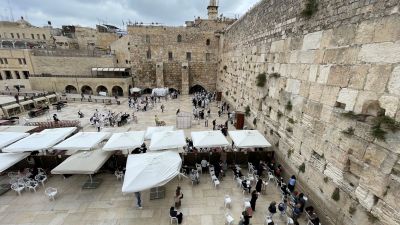“Pressing Palms to Stone”: My Experience at the Western Wall
Faith Fegley
The Western Wall’s courtyard smelled of frying onions, sour red wine and yeastless bread. The sun blazed down on our heads, to the point that it made my pale scalp burn and my hair curl with sweat around the base of my neck. I longed for my cheap sunglasses and a glass of water that was not lukewarm. Staring down at the tan concrete, I watched ripples of heat waves dance and disappear into the ends of long, loose skirts and black dress pants of traveling persons.
I craned my neck to find the top of the Western Wall, marked by patches of emerald grasses and slivers of paper covered in begging prayers. The wall seemed to extend to the heavens.
Here across the courtyard was also a dividing wall between men and women. The men gathered in deep voiced prayers, holding their leather bound Torahs. The women huddled alone around plastic lawn chairs, necks bowed in tears and yet to be answered calls to God.
The mothers of boys celebrating their Bar Mitzvahs stood on their toes atop slick metal benches, hoping to watch at least a moment of their sons’ biggest achievements yet.
The Western Wall is an extremely regulated Judaic site, currently under the control of the orthodox Hasidic Jews. This was not lost on any of us. While the men in our group got to stroll across the courtyard, entering a separate room filled with holy Jewish documents meant only for the eyes of men, the women struggled to find space to squeeze past one another to place their palms to the wall. While suit clad men read loudly from their Torah scrolls, gathering around folding tables in celebration, the women’s side held an eerie desperate silence.
The ache I felt as I watched mothers, who had birthed these sons and raised them, watch their Bar Mitzvahs through fence cracks, sat like a rock in my stomach.
Yet I knew that we were visiting a site that my Mother’s side had spoken of with reverence for my whole life. We would be touching the cold stones of the wall with open palms; a thought alone that made my Mother’s eyes well up. It was not hard to feel a sense of pride in this visit.
But still I felt a weight on my chest, a strong sense of guilt, shame, and embarrassment.
It had only been since coming to Israel that I was in the majority by being ethnically Jewish. To go from hiding my Star of David necklace from the fear of anti-Semitic acts in the United States, to hiding it so that Palestinian children who would see me would not be afraid of me hurting them. To see the beautiful culture I grew up with, the culture associated with those I love the most, tied to Zionist arguments justifying murder, bombing of innocent persons, and ethnic cleansing.
The emotions are complex, world altering, gutting.
Because here, despite the misogyny of the dividing gender wall, I could remember that Judaism is not meant to be a weapon. Here I could remember what Judaism is meant to be, what it should be. It is remembering others before yourself, speaking with peace and patience, accepting others with all of your being, meeting others where they are.
Here I felt my Great Grandmother’s arms around me. Here I could hear my Grandfather saying “Dear, you look just like her”, with my dark hair tucked around my chin. Here I could smell the twisting challah loaves my Mother and I had always made poor attempts at, but scarfed down regardless.
Yet what is peace without guilt? What are tears with shame? Is there ever a time when we can be fully ourselves without fear; a weight pressing on our chests? How can I speak of this experience, how can I describe the overwhelming, earth shattering emotions in just a few words? There are such complexities that come with being Jewish, ones that I believe that I will never fully understand.
Here at the Western Wall, a site of Judaism, I thought not just of my family and heritage. I thought of the nonviolent resistance of the Palestinians that should not have to happen in the first place. The sweeping artwork, the joyful faces, the making of hummus, not walls. The children playing through the streets of refugee camps, the offering of coffee and tea and a place to rest your head everywhere you go.
I urge you to turn to @jewishvoiceforpeace on Instagram, a group of Jewish persons who organize to show Judaism beyond Zionist beliefs. I also urge you to turn to @eye.on.palestine and tentofnations.com. Love all, serve all.







